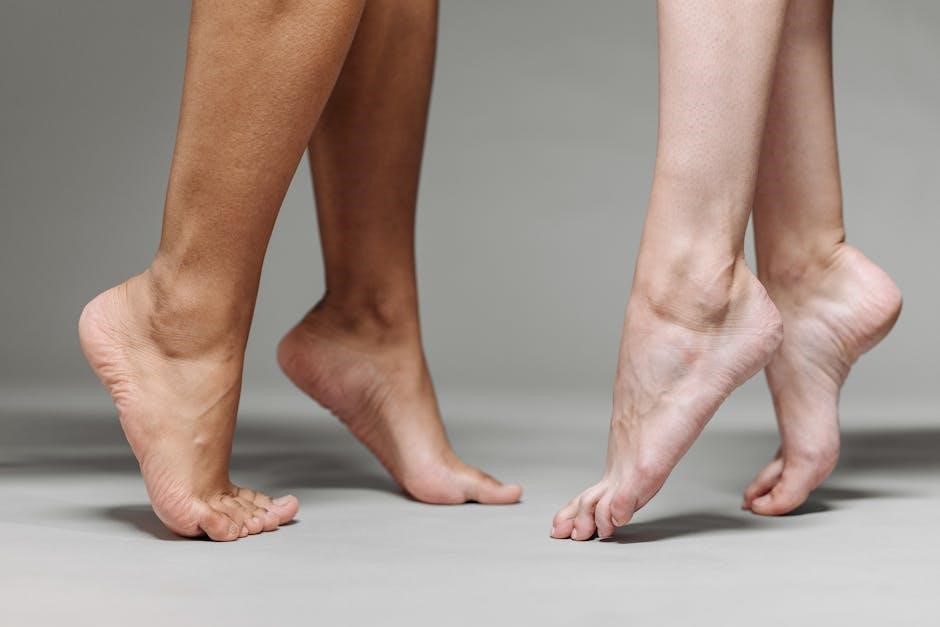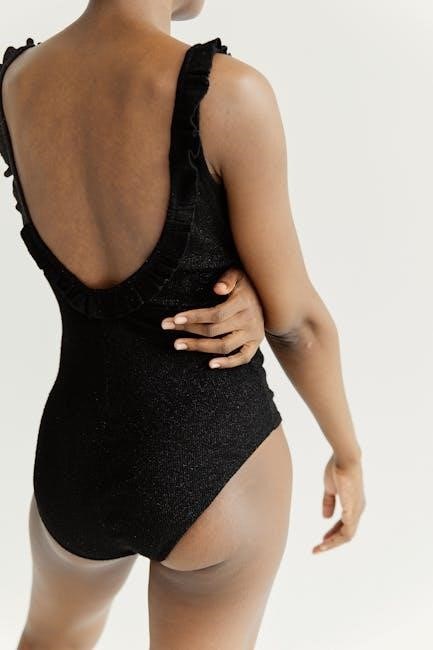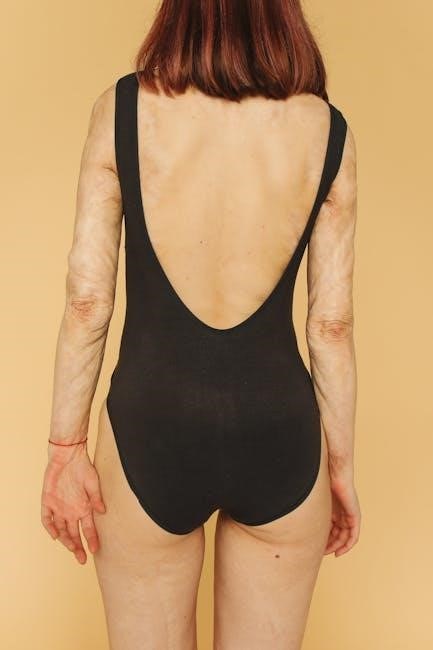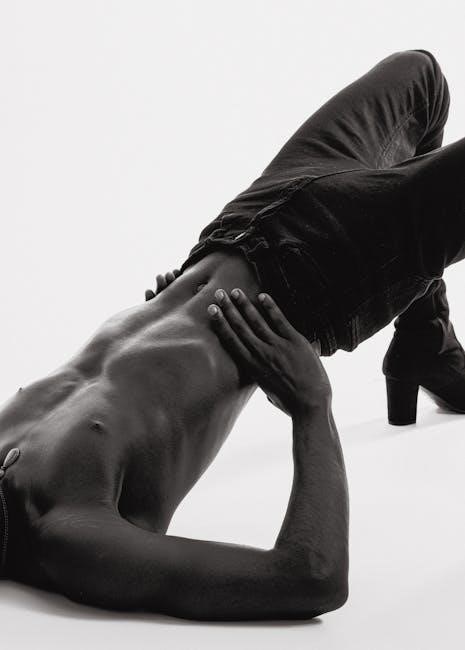fearing the black body pdf

Fearing the Black Body: The Racial Origins of Fat Phobia by Sabrina Strings is a groundbreaking exploration of how fat phobia is deeply rooted in racism and societal power structures‚ challenging conventional narratives about health and aesthetics․ Published in 2019‚ this book has sparked critical conversations about body image‚ race‚ and gender‚ offering a fresh perspective on the origins of fat stigma and its impact on Black women․ Strings’ meticulous research and compelling arguments have made the book a significant contribution to sociological and cultural studies‚ earning it widespread acclaim and recognition․

About the Author: Sabrina Strings
Sabrina Strings is an associate professor of sociology at the University of California‚ Irvine․ Her work focuses on the intersections of race‚ gender‚ class‚ and body image‚ offering a critical perspective on societal norms․ Strings earned her Ph․D․ in sociology‚ equipping her with the tools to explore how historical and cultural forces shape our perceptions of the body․ Her award-winning book‚ Fearing the Black Body‚ has been praised for its meticulous research and innovative approach to understanding fat phobia as a racialized phenomenon․ Strings’ scholarship has been recognized in various academic and media platforms‚ solidifying her role as a leading voice in the study of body politics and racial justice․
Overview of the Book
Fearing the Black Body examines the origins of fat phobia‚ linking it to race and societal structures‚ from the Renaissance to today‚ challenging health-centered narratives․
3․1․ The Central Thesis
Sabrina Strings’ central argument in Fearing the Black Body posits that fat phobia is not rooted in concerns about health but in systemic racism and social control․ She contends that the stigma associated with larger bodies‚ particularly those of Black women‚ emerged from historical ideologies that equated thinness with moral superiority and racial purity․ Strings traces this narrative back to the Enlightenment‚ where scientific and philosophical frameworks were used to justify racial hierarchies․ By examining art‚ literature‚ and medical discourse‚ she illustrates how fatness became a metaphor for racial and moral inferiority․ This thesis challenges common perceptions of body image‚ revealing how fat phobia serves as a tool to reinforce race‚ class‚ and gender inequalities․
3․2․ Historical Roots of Fat Phobia
Sabrina Strings traces the origins of fat phobia to the Enlightenment period‚ where racial and gendered ideologies converged to stigmatize Black bodies․ She argues that the association of thinness with moral and intellectual superiority emerged alongside the dehumanization of Black people‚ particularly Black women․ During this time‚ fatness became a marker of racial and gender inferiority‚ reinforcing white supremacy․ Strings highlights how scientific and cultural discourses perpetuated these notions‚ creating a lasting impact on societal perceptions of body size․ By examining historical art‚ literature‚ and medical texts‚ she reveals how fat phobia was weaponized to marginalize Black women‚ laying the groundwork for modern fat stigma rooted in racism and misogyny․

Main Arguments of the Book
Sabrina Strings argues that fat phobia is rooted in racism‚ classism‚ and sexism‚ tracing its origins to historical ideologies that marginalize Black women’s bodies for societal control․
4․1․ Race and Fat Phobia
Race is central to the development of fat phobia‚ as Sabrina Strings argues that anti-Blackness has historically been used to justify the stigmatization of larger bodies․ She traces how Enlightenment-era ideologies linked Blackness to primitivism and excess‚ creating a racialized narrative that equated fatness with moral failure․ This stigma was disproportionately applied to Black women‚ whose bodies were pathologized and policed as symbols of societal deviance․ Strings contends that fat phobia is not merely about health but serves as a tool to reinforce racial hierarchies and control Black bodies․ By examining the intersection of race and body image‚ she reveals how fatphobia has been weaponized to marginalize and oppress Black individuals‚ particularly women‚ for centuries․
4․2․ Class and Body Image
Class plays a significant role in shaping body image norms‚ as thinness has historically been tied to wealth and status․ Sabrina Strings argues that the idealization of thin bodies emerged alongside capitalist values‚ where bodily control symbolized moral virtue and economic success․ This narrative perpetuates the notion that thinner bodies are more disciplined and deserving‚ while larger bodies are seen as failures․ Class intersects with race and gender‚ amplifying fatphobia for marginalized groups․ Strings highlights how societal beauty standards are not neutral but reflect and reinforce economic hierarchies‚ further marginalizing those already oppressed․ By linking body image to class‚ she exposes how fatphobia serves as a tool to uphold social and economic inequalities‚ perpetuating systemic injustice․
4․3․ Gender and the Fear of the Black Body
Gender dynamics deeply influence the fear of the Black body‚ particularly targeting Black women․ Sabrina Strings examines how societal expectations of femininity and beauty intersect with race‚ creating unique forms of fatphobia․ Black women’s bodies are often hyper-sexualized and policed‚ with their size used to perpetuate stereotypes of “unruliness” and deviance․ Historical narratives portray Black women as inherently less feminine‚ reinforcing fat stigma as a means of control․ Strings argues that this fear is not just about race or class but also about maintaining patriarchal ideals of female bodies․ The intersection of gender and race amplifies fatphobia‚ making Black women disproportionately vulnerable to body shaming and marginalization․ This chapter highlights how gendered biases perpetuate systemic inequality and body image struggles for Black women․
4․4․ The Myth of Health
Sabrina Strings challenges the widely held belief that fat phobia is rooted in concerns about health․ She argues that this narrative is a modern justification for deeply ingrained racial and gender biases․ Historical medical discourse often framed Black bodies‚ particularly those of Black women‚ as inherently diseased or unhealthy due to their size․ This perception was not based on scientific evidence but on racist stereotypes․ Strings contends that the association of fatness with poor health is a convenient myth that obscures the true origins of fatphobia in racism and social control․ By examining the medicalization of body size‚ she reveals how health rhetoric has been weaponized to perpetuate inequality and justify discrimination․ This chapter exposes the flawed logic behind equating body size with health outcomes․

Historical Context
The book traces the historical roots of fat phobia to the Renaissance and Enlightenment periods‚ where societal trends and medical discourse laid the groundwork for modern fat stigma․
5․1․ The Renaissance Period
The Renaissance period serves as a foundational era in the emergence of fat phobia‚ as shifting cultural ideals of beauty and morality began to associate body size with moral worth․ Sabrina Strings highlights how during this time‚ the idealization of slim‚ disciplined bodies reflected broader societal values tied to race‚ class‚ and gender․ The Renaissance also saw the rise of artistic and philosophical frameworks that glorified specific physical forms‚ marginalizing those deemed “other‚” including Black bodies․ These early developments laid the groundwork for fat stigma‚ linking it to notions of immorality and inferiority․ Strings argues that this period marked the beginning of a long-standing cultural obsession with thinness‚ deeply intertwined with racism and exclusion․
5․2․ Enlightenment and the Emergence of Fat Stigma
The Enlightenment period played a pivotal role in cementing fat stigma‚ as scientific and philosophical ideas began to explicitly link body size to moral and racial hierarchies․ Sabrina Strings demonstrates how Enlightenment thinkers framed fatness as a sign of moral failing and lack of self-control‚ particularly in Black bodies․ This era saw the rise of pseudoscientific classifications that tied race‚ body size‚ and inferiority‚ solidifying fat phobia as a tool of social control․ By casting Black women as inherently excessive and diseased‚ Enlightenment ideologies laid the groundwork for modern fat stigma‚ ensuring its persistence as a mechanism for marginalizing Black bodies․ These ideas continue to resonate in contemporary society‚ underscoring the enduring legacy of this period․

Societal Impact of Fat Phobia
Fat phobia perpetuates systemic discrimination‚ disproportionately affecting Black women by reinforcing stereotypes‚ limiting opportunities‚ and perpetuating health disparities․ It shapes cultural norms‚ media representation‚ and public policy‚ further marginalizing already vulnerable groups and normalizing their exclusion from societal acceptance and resources․
6․1․ On Black Women
Fat phobia disproportionately targets Black women‚ perpetuating intersecting race‚ gender‚ and body-based discrimination․ Sabrina Strings highlights how Black women’s bodies have historically been pathologized‚ reinforcing stereotypes of disease and burden․ This stigma manifests in systemic marginalization‚ affecting healthcare access‚ employment opportunities‚ and personal relationships․ The devaluation of Black women’s bodies is rooted in colonial and Enlightenment ideologies‚ which framed Blackness and fatness as deviant․ These harmful narratives have endured‚ contributing to ongoing struggles with body image and societal acceptance․ The book underscores the urgent need to challenge these biases and reclaim Black women’s bodies from oppressive cultural and historical frameworks‚ advocating for a more inclusive and equitable understanding of beauty and health․ This fight is central to dismantling fat phobia’s enduring impact on Black women’s lives․
6․2․ In Media and Culture
Fat phobia’s portrayal in media and culture amplifies its societal impact‚ particularly against Black bodies․ Sabrina Strings examines how historical art and literature from the Renaissance and Enlightenment periods idealized thinness while demonizing fatness‚ linking it to moral and racial inferiority․ Modern media continues this narrative‚ glorifying thin bodies and marginalizing fat individuals‚ especially Black women․ These representations perpetuate stereotypes‚ reinforcing the notion that fatness is a personal failing rather than a result of systemic oppression․ The book critiques the lack of diverse body representation and the normalization of fat stigma in popular culture‚ urging a reevaluation of how media shapes perceptions of beauty‚ health‚ and race․ This cultural conditioning perpetuates fat phobia’s harmful effects across generations․
Personal and Collective Trauma
Fearing the Black Body delves into the profound personal and collective trauma inflicted by fat phobia‚ particularly on Black women․ Sabrina Strings highlights how societal disdain for fatness is deeply intertwined with anti-Black racism‚ leading to internalized shame and self-hatred․ This trauma is not only individual but also intergenerational‚ passed down through centuries of systemic oppression․ The book explores how fat phobia has been used as a tool to demean and marginalize Black bodies‚ perpetuating cycles of pain and invisibility․ By examining the emotional and psychological toll of fat stigma‚ Strings emphasizes the urgent need for healing and liberation from these oppressive narratives․ Her work challenges readers to confront and dismantle the structures that perpetuate this trauma․

Cultural Norms and Body Image
Cultural norms have significantly shaped body image‚ particularly in relation to race and fat phobia․ Sabrina Strings examines how European beauty standards‚ rooted in the Renaissance‚ elevated thinness as a symbol of morality and civilization․ These ideals were juxtaposed with the perceived “otherness” of Black bodies‚ fostering a deep-seated fear of fatness․ The book reveals how fat phobia became a tool to marginalize Black women‚ reinforcing racial and class hierarchies․ Strings argues that these cultural norms have been perpetuated through media‚ art‚ and literature‚ creating a cycle of body shaming and internalized oppression․ By tracing the historical origins of these norms‚ Fearing the Black Body challenges readers to question and dismantle harmful beauty standards‚ promoting a more inclusive understanding of body image․ This analysis underscores the enduring impact of cultural narratives on self-perception and societal attitudes․

Contributions to Sociological Scholarship
Sabrina Strings’ Fearing the Black Body offers a transformative contribution to sociological scholarship by challenging traditional narratives about body image and fat phobia․ The book bridges sociology‚ history‚ and cultural studies‚ providing a nuanced exploration of how race‚ gender‚ and class intersect to shape societal attitudes toward Black bodies․ By tracing the historical roots of fat stigma‚ Strings advances a critical framework that dismantles the myth that fat phobia is solely about health․ Her work significantly contributes to intersectional scholarship‚ revealing how body image is a tool of power and control․ This groundbreaking analysis has enriched academic discourse‚ offering new perspectives on identity‚ inequality‚ and cultural norms‚ while inspiring further research into the sociopolitical dimensions of body perception․

Reviews and Reception
Fearing the Black Body has garnered widespread critical acclaim for its original and incisive analysis of fat phobia’s racial origins․ The book has been praised by prominent outlets such as Essence‚ Bitch Media‚ and Ms․‚ with reviewers highlighting its meticulous research and groundbreaking arguments․ Sabrina Strings’ work has been described as a “transformative contribution” to sociological scholarship‚ offering a fresh perspective on the intersections of race‚ gender‚ and body image․ The book has also earned awards and recognition within academic circles‚ solidifying its impact on contemporary discourse․ Readers and scholars alike have praised Strings for her ability to weave historical narratives with contemporary issues‚ making Fearing the Black Body a pivotal work in understanding the societal fear of Black bodies and its deep-rooted implications․
Modern Relevance and Applications
Fearing the Black Body holds profound relevance in today’s society‚ where body image issues‚ racial disparities‚ and health debates remain prevalent․ Sabrina Strings’ analysis of fat phobia as a tool of racial and gender control resonates deeply in contemporary conversations about inclusivity and social justice․ The book’s arguments are particularly timely in addressing the ongoing marginalization of Black women and the perpetuation of harmful stereotypes in media and culture․ By tracing the historical roots of fat stigma‚ Strings provides a framework for understanding and challenging modern-day discrimination‚ making her work a vital resource for activists‚ educators‚ and policymakers seeking to dismantle systemic inequities and promote body positivity and equity․
Fearing the Black Body by Sabrina Strings offers a powerful and thought-provoking examination of fat phobia’s racial origins‚ challenging readers to reconsider societal norms and biases․ By linking fat stigma to historical racism‚ classism‚ and sexism‚ Strings provides a nuanced understanding of how body image has been weaponized against marginalized groups‚ particularly Black women․ Her work not only sheds light on the past but also encourages a reevaluation of contemporary attitudes toward bodies․ Through meticulous research and compelling arguments‚ Strings underscores the importance of dismantling these harmful ideologies to foster a more equitable society․ This book is a vital call to action‚ urging readers to confront and challenge the deep-seated fears and prejudices embedded in our culture․
Further Reading and Resources
For those interested in exploring the themes of Fearing the Black Body further‚ Sabrina Strings’ work can be complemented by additional resources․ The book is available in PDF format for academic and personal use‚ offering a deeper dive into the racial origins of fat phobia․ Readers can also explore reviews and interviews featuring Strings‚ such as those in Essence‚ Bitch Media‚ and Ms․ Magazine‚ which provide insights into her research and its impact․ Additionally‚ UCLA and UC Irvine resources highlight Strings’ academic contributions‚ while works on body positivity‚ critical race theory‚ and feminist scholarship offer broader contexts for understanding the intersectionality of body image and societal structures․
- Download the PDF version of Fearing the Black Body for in-depth analysis․
- Explore reviews and interviews with Sabrina Strings in major publications․
- Visit UCLA and UC Irvine resources for academic insights․
- Read complementary works on body positivity and feminist theory․

FAQs About the Book
Fearing the Black Body: The Racial Origins of Fat Phobia by Sabrina Strings has sparked numerous questions about its themes and implications․ Below are some frequently asked questions:
- What is the book about? It explores how fat phobia is rooted in racism and societal power structures‚ particularly affecting Black women․
- What is the main argument? Strings argues that fat stigma is not about health but is a tool to enforce racial‚ class‚ and gender hierarchies․
- Who is the target audience? It appeals to scholars‚ activists‚ and anyone interested in race‚ gender‚ and body image․
- Where can I find the PDF? The book is available in PDF format for academic and personal use through various online platforms․
- What makes this book unique? Its intersectional approach connects historical and contemporary issues‚ offering a fresh perspective on body politics․
These questions highlight the book’s significance and accessibility for readers seeking to understand the deep-rooted causes of fat phobia․
References and Citations
The book Fearing the Black Body: The Racial Origins of Fat Phobia by Sabrina Strings is well-supported by extensive research and citations․ Below are key references:
- Strings‚ Sabrina․ Fearing the Black Body: The Racial Origins of Fat Phobia․ NYU Press‚ 2019․
- Reviewed in Essence‚ Bitch Media‚ and Ms․ Magazine‚ highlighting its cultural impact․
- Cited in academic journals for its original analysis of race‚ class‚ and gender in body politics․
- Featured in discussions on platforms like UCLA’s Center for the Study of Women․
- Referenced in sociological studies on fat stigma and anti-Blackness․
These references underscore the book’s academic rigor and its influence in scholarly and cultural discourse․
Final Word on the Book’s Importance
Fearing the Black Body by Sabrina Strings is a groundbreaking work that reshapes our understanding of fat phobia‚ revealing its deep roots in racism‚ classism‚ and gender bias․ By tracing the origins of fat stigma back to historical and societal structures‚ Strings challenges the notion that body size is solely about health or aesthetics․ Her meticulous research and compelling arguments make this book a must-read for anyone seeking to understand the intersections of race‚ body image‚ and power․ The book’s importance lies in its ability to spark critical conversations and inspire change‚ earning it widespread acclaim in both academic and cultural circles․ It remains a vital resource for dismantling oppressive systems and fostering inclusivity․

Call to Action for Readers
Fearing the Black Body is a transformative read that challenges readers to rethink societal norms and biases․ We urge everyone to engage with this critical work‚ as it offers invaluable insights into the intersections of race‚ gender‚ and body image․ Readers are encouraged to reflect on their own biases‚ share the book with others‚ and join conversations that promote inclusivity and understanding․ By embracing this knowledge‚ we can collectively work toward dismantling harmful stereotypes and fostering a more equitable society․ Download the PDF and take the first step toward a more informed and compassionate perspective on body politics․
Leave a Reply
You must be logged in to post a comment.